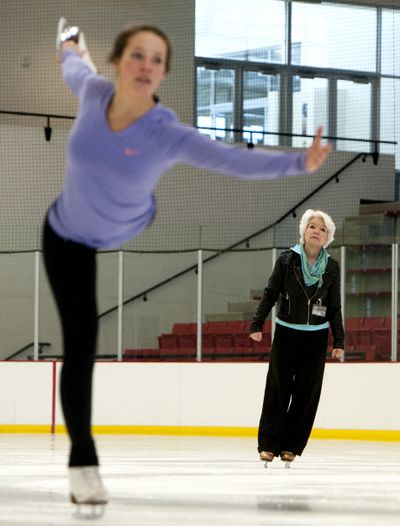1976 Olympic figure skater coaches area athletes

At Eastern Washington University’s recreation center, a former Olympic figure skater is helping her students of all ages find an edge on the ice and in life.
Karin Künzle-Watson, 59, of Coeur d’Alene, is a sought-after figure skating coach and mentor in the area, with some skaters traveling up to two hours for lessons with her.
“I don’t know how people find out about me, I think word-of-mouth. The skating community is fairly small,” she said.
Künzle-Watson, who started skating at 6, competed in the 1976 Olympics in Innsbruck, Austria, with her twin brother, Christian Künzle. The Swiss pair placed seventh. The pair were seven-time gold medalists at the Swiss Figure Skating championships and won the 1976 Professional World Championships. Künzle-Watson came to the U.S. in 1981.
She coaches with the Inland Northwest Figure Skating Club. The club skates at the Eastern Washington University Recreation Center in Cheney, where Künzle-Watson is also a faculty member teaching several P.E. skating classes.
“Karin relates to all ages as an instructor, from 3-year-olds to 63-year-olds,” said Jamie Gwinn, URC operations manager.
One of Künzle-Watson’s longtime students is 19-year-old Emily Korotish, who started lessons with her at age 6.
“In the very beginning, Emily just skated because she had fun. She had very good parents, skated on a regular basis, and had a good start. She had all the potential to go on quite further,” Künzle-Watson said.
Korotish said her family skated together and that her father was her biggest fan. But when she was 16, her father died unexpectedly.
“It took me a while to get the courage to get back on the ice,” Korotish said.
The EWU sophomore came back and now skates at the recreation center with Künzle-Watson to prepare for an upcoming free-skate gold test.
“He is the reason behind my goals to pass my last two gold tests and complete the cycle we began together,” Korotish said.
Passing the test will give Korotish options, Künzle-Watson said.
“Maybe at some point she’ll want to do a show for a year, or teach, or become a judge. All these ways are open for her,” she said.
Korotish skated with Künzle-Watson’s brother when he visited last month.
“It was pretty cool. He was helping me on the ice,” she said.
“Christian was extremely talented,” Künzle-Watson said. “He just looked at things and did it. Well! I had to work for that and was very shy. Whereas, he could know everybody’s name and their goldfish’s name.”
Künzle-Watson supports her students on and off the ice. She frequently gives students rides to practice and has sewn skating costumes, including a gypsy dress for Korotish.
And she encourages kindnesses among the skaters, suggesting older skaters pass along skates and costumes to younger ones.
Künzle-Watson enjoys working with young children who start out barely being able to move on the ice. “Clearly, some of the young girls who go into this sport, have what I call ‘stars in their eyes.’ The more effortless it looks, the harder it is. It takes hours of hard work, sweat, tears and frustration. I’ve been blessed and am paying back some of that.”
As the Winter Olympics in Sochi, Russia, approach, it brings back bittersweet memories.
The Künzle twins qualified for the Olympics in 1972, but the Olympic Committee decided that at least one person in a team had to be 18.
“Neither one of us was. We didn’t get to go. I can feel very strongly sympathetic now for people who are left at home for whatever reason. It’s devastating,” Künzle-Watson said.
When they did go in 1976, “We were the only male-female twins in Olympic history in the same sport and at the same Olympics,” she said. (Other twins, West Germany’s Ferdinand and Antonia Becherer, skated in 1988.)
“I happened to be in the right place at the right time, to be able to achieve what I have achieved,” Künzle-Watson said. “It’s part of me, but not what makes me tick. This is a lesson for life – perseverance, not giving up when it’s hard. As it has been for Emily, it is about the journey, not the destination.”